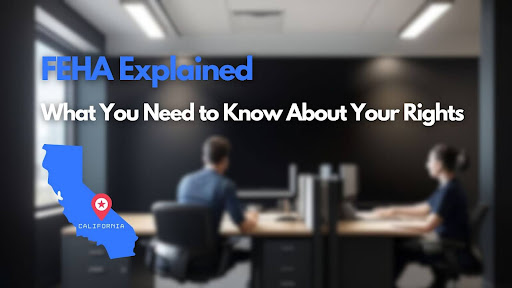Introduction
Navigating the complexities of the California Fair Employment and Housing Act (FEHA) can feel daunting, but understanding your rights is crucial for fostering a fair and inclusive environment.
At its core, FEHA is designed to protect individuals from discrimination and harassment in both employment and housing. This article will guide you through the essentials of FEHA, focusing on employee rights, housing rights, common violations, and the resources available for those who need them.
Overview of FEHA
FEHA, detailed in California GovernmentCode §§12900 – 12996, is a significant piece of legislation that applies to both public and private employers with five or more employees, as well as housing providers.
It is a California discrimination law that prohibits discrimination based on a wide range of characteristics, including race, color, religion, sex, gender identity, sexual orientation, national origin, disability, and age.
The California Civil Rights Department (CRD) oversees the enforcement of these laws, ensuring that everyone in California has equal access to opportunities.
Employee Rights Under FEHA
In the workplace, FEHA ensures that employees are treated fairly and with respect. Here’s what you need to know about your employee rights:
- Protection Against Discrimination: Employers are prohibited from making employment decisions—such as hiring, promotions, or terminations—based on protected characteristics.
- Harassment Prevention: FEHA requires employers to maintain a harassment-free workplace. This means taking immediate and appropriate action to address any complaints.
- Retaliation Protection: Employees are protected from retaliation if they oppose discriminatory practices, file complaints, or participate in investigations.
- Reasonable Accommodations: Employers must provide reasonable accommodations for employees with disabilities unless doing so would cause undue hardship. This is a key aspect of ensuring accessibility and inclusivity in the workplace.
Understanding your rights under the California Fair Employment and Housing Act (FEHA) is crucial for addressing discrimination and harassment claims. If you require mediation services or personalized guidance, schedule a 30-minute consultation to discuss your concerns and explore effective resolution strategies.
Housing Rights Under FEHA
FEHA’s protections extend beyond the workplace and into housing. It ensures that everyone has equal access to housing opportunities:
- Equal Access: Housing providers must offer rental and sale opportunities to all individuals, regardless of their protected status. This is a fundamental principle under FEHA.
- Reasonable Accommodations: Just as in employment, housing providers are required to make reasonable accommodations for individuals with disabilities, such as allowing service animals or modifying policies to ensure accessibility.
Common Violations of FEHA
Despite its comprehensive protections, FEHA violations can and do occur. Some common issues include:
- Failure to Accommodate Disabilities: This occurs when employers or housing providers do not provide necessary accommodations for individuals with disabilities.
- Retaliation: Taking adverse actions against individuals who report discrimination or harassment is a violation of FEHA.
- Harassment: Allowing a hostile work or living environment to persist without intervention is a serious breach of FEHA guidelines.
If you suspect a violation of your FEHA rights, don’t hesitate to contact Resolve Wannon at 310-592-4359 for guidance and mediation services.
Resources for Victims of Discrimination
If you believe your rights under FEHA have been violated, there are several steps you can take:
- Filing a Complaint: You can file a complaint with the California Department of Fair Employment and Housing (DFEH) within three years of the alleged violation.
- Legal Action: Pursuing legal action can lead to remedies such as compensatory damages, policy changes, or reinstatement.
- Mediation Services: At Resolve Wannon, we specialize in mediation services that provide a neutral platform for resolving disputes amicably. Mediation can be a powerful tool for finding common ground without the need for litigation. Feel free to contact us at 310-592-4359 or visit our website for more information.
Understanding your rights under FEHA is essential for both employees and housing tenants in California. By staying informed, individuals can better protect themselves against discrimination, while employers and housing providers can ensure compliance with the law. As a mediation specialist law firm, Resolve Wannon is committed to helping both parties reach amicable resolutions. Contact us at 310-592-4359 or visit our website for more information.
Top FAQs About the California Fair Employment and Housing Act (FEHA)
What are employee rights under FEHA?
Employees have the right to work free from discrimination and harassment based on protected characteristics. They are also entitled to reasonable accommodations for disabilities.
How does FEHA address discrimination in housing?
FEHA prohibits discrimination in all housing-related activities, ensuring equal access and requiring reasonable accommodations for individuals with disabilities.
What recourse do victims of FEHA violations have?
Victims can file a complaint with the DFEH, seek legal action, or utilize mediation services. Resolve Wannon is here to assist with mediation needs; reach out to us at 310-592-4359 for guidance.
Who is covered under FEHA?
FEHA covers public and private employers with five or more employees, housing providers, and various other entities involved in employment and housing.
What is the statute of limitations for filing a complaint under FEHA?
Individuals have three years from the date of the alleged violation to file a complaint with the DFEH.
